
Solanum mauritianum is a small tree or shrub native to South America, including Northern Argentina, Southern Brazil, Paraguay and Uruguay. Its common names include earleaf nightshade, woolly nightshade, flannel weed, bugweed, tobacco weed, tobacco bush, wild tobacco and kerosene plant.

Phacelia crenulata is a species of flowering plant in the borage family, Boraginaceae. Its common names include notch-leaf scorpion-weed, notch-leaved phacelia, cleftleaf wildheliotrope, and heliotrope phacelia. Phacelia crenulata has an antitropical distribution, a type of disjunct distribution where a species exists at comparable latitudes on opposite sides of the equator, but not at the tropics. In North America, it is native to the southwestern United States as far east as Colorado and New Mexico, and Baja California and Sonora in Mexico. In South America, it is native to southern Peru, western Bolivia, and northern Chile.

Symphyotrichum laeve is a flowering plant native to Canada, the United States, and Coahuila (Mexico). It has the common names of smooth blue aster, smooth aster, smooth-leaved aster, glaucous Michaelmas-daisy and glaucous aster.
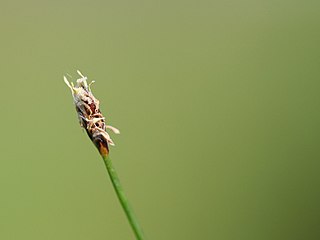
Eleocharis acicularis is a species of spikesedge known by the common names needle spikerush and least spikerush. It is widespread across Europe, central and southeastern Asia, North America and northeastern South America as far south as Ecuador. It is also found in Australia, where it is probably an introduced species.
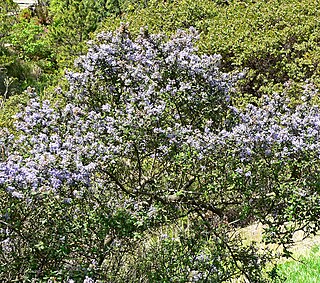
Ceanothus impressus is a species of shrub in the family Rhamnaceae known by the common name Santa Barbara ceanothus. It is endemic to the Central Coast of California, where it is known from San Luis Obispo and Santa Barbara Counties. It occurs in chaparral habitat.
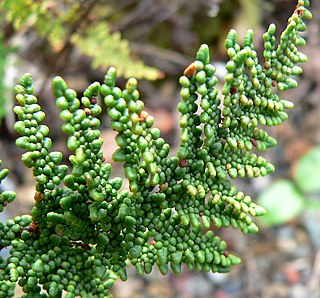
Myriopteris clevelandii, formerly known as Cheilanthes clevelandii, is a species of lip fern known by the common name Cleveland's lip fern. It is native to southern California and Baja California in Mexico. The leaf is divided into small, bead-like segments densely covered with scales beneath. In M. clevelandii, some of these scales are reduced to hairlike structures, which help distinguish it from the closely related M. covillei. It is usually found growing on exposed rock, particularly igneous rock.
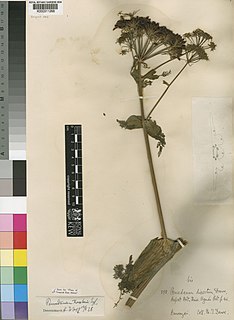
Afrosciadium kerstenii, synonym Peucedanum kerstenii, is a member of the carrot family, Apiaceae. It is native to east tropical Africa and the Democratic Republic of the Congo (Zaïre). It grows among the giant groundsels (Dendrosenecio) atop of the mountains of east Africa: Mount Kilimanjaro, Mount Kenya, Rwenzori Mountains and the Virunga Volcanoes.

Anemone multifida is a species of flowering plant in the buttercup family known by the common names cutleaf anemone, Pacific anemone and globe anemone. It is a perennial herb native to northern North America from Alaska to New York and as far south as Arizona and New Mexico. It is also known from parts of South America.

Lepidium montanum is a species of flowering plant in the mustard family known by the common names mountain pepperweed, mountain peppergrass, mountain pepperwort, and mountain pepperplant. It is native to western North America from Oregon to Montana to northern Mexico, where it can be found in a number of habitats, often on salty or gravelly soils. There are several varieties, many of which are difficult to distinguish.

Cercocarpus ledifolius var. intricatus is a variety of Cercocarpus ledifolius that is commonly known as little-leaf mountain mahogany.

Chrysothamnus viscidiflorus is a species of shrub in the family Asteraceae of the Americas known by the common names yellow rabbitbrush and green rabbitbrush.

Phacelia hastata is a species of flowering plant in the borage family, Boraginaceae. Its common names include silverleaf scorpionweed, silverleaf phacelia, and white-leaf phacelia. It is native to western North America from British Columbia and Alberta south to California and east to Nebraska. It can be found in many types of habitat, including scrub, woodland, and forest, up to an elevation of 13,000 feet. It prefers sandy to rocky soil.

Escobaria minima is a rare species of cactus known by the common names Nellie cory cactus, Nellie's pincushion cactus, birdfoot cactus, and others. It is a very popular species among cactus collectors. This is one reason why it is a highly endangered species in the wild today. This cactus is found only in Brewster County, Texas, in the United States, where there are three populations remaining near Marathon. The cactus is limited to one outcrop in the Marathon Uplift, where it grows in rocky novaculite soils. It was added to the endangered species list in 1979.

Tetraneuris acaulis is a North American species of flowering plants in the sunflower family. Common names include angelita daisy, stemless four-nerve daisy, stemless hymenoxys, butte marigold, and stemless rubberweed.
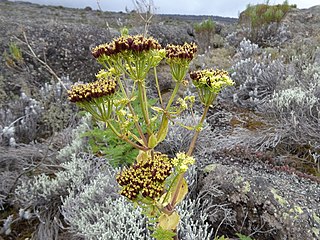
Afrosciadium is a genus of flowering plants belonging to the carrot family, Apiaceae. It was split from the genus Peucedanum in 2008 by P.J.D. Winter, et al.
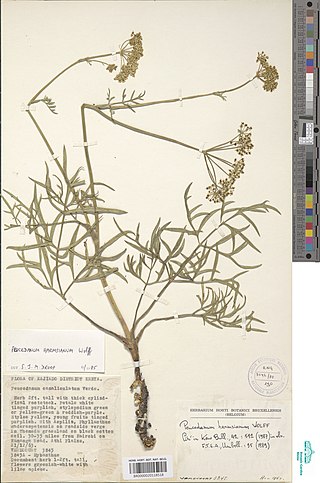
Afrosciadium harmsianum is a member of the carrot family, Apiaceae. It is a perennial tuberous herb native to east tropical Africa, while the subspecies A. h. australe is endemic to northern Tanzania.

Afrosciadium dispersum is a member of the carrot family, Apiaceae. It is a perennial tuberous herb native to tropical mountains in South Sudan, northern Uganda, and southwestern Tanzania.

Afrosciadium englerianum is a member of the carrot family, Apiaceae. It is a perennial tuberous herb, endemic to the Aberdare Mountains in Kenya.

Afrosciadium eylesii is a member of the carrot family, Apiaceae. It is a perennial tuberous herb native to southeastern Africa, from the Democratic Republic of the Congo and Tanzania to Zimbabwe and Mozambique.

Afrosciadium lynesii is a member of the carrot family, Apiaceae. It is a perennial tuberous herb native to southern tropical Africa.




















